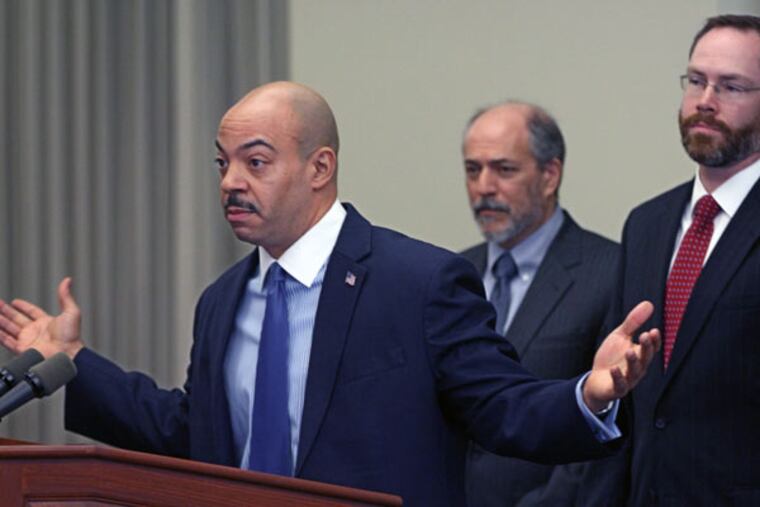Williams likens himself to 'Rambo,' says Kane 'drew first blood'
The D.A. announced criminal charges against 3 more public officials in a corruption probe dropped by the A.G.

IT'S FAIR TO ASSUME that yesterday state Attorney General Kathleen Kane had a terrible, horrible, no good, very bad day. Again.
And Philadelphia District Attorney Seth Williams expressed little sympathy, characterizing Kane as "her own worst enemy."
"I found myself like John J. Rambo. They drew first blood," Williams said, referring to Kane's office.
Williams made the comments at a news conference in which he detailed a new round of bribery-related charges against three more former and current public servants in a corruption probe that Kane had said was "not prosecutable."
After taking office in 2013, Kane shut down the investigation, which was launched by her predecessor, then-Attorney General Tom Corbett, in 2010. Williams then took up the case.
"Prosecutors exercise discretion all the time on the merit of pursuing a case," Kane spokeswoman Carolyn Myers wrote in an email yesterday. "Attorney General Kane supports the efforts of all District Attorneys to obtain equal justice under the law."
By the end of the day, state Reps. Louise Williams Bishop, 81, and Michelle Brownlee, 58, and former state Rep. Harold James, 72, had turned themselves in to State Police after Williams filed criminal charges against them. The three were caught on tape accepting money from lobbyist-turned-informant Tyron Ali in exchange for votes and political influence in Harrisburg, according to grand-jury findings.
The recordings, surreptitiously made by Ali, revealed that Bishop, who refused to answer questions when she appeared before the grand jury, accepted three cash payments totaling $1,500.
In one instance, Bishop met Ali at a Philly restaurant. When he handed her $500, Bishop said, "That's a biggie." She also told him, "Well, I am delighted that I have you as a friend."
In taking the money, Bishop set about "stacking" the House Liquor Control Committee with members who would push liquor-store privatization on behalf of one of Ali's fictitious clients, who wanted to open a sports bar, the grand jury found.
Bishop's attorney, A. Charles Peruto Jr., said he believed that Williams had violated grand-jury secrecy rules by divulging that his client "took the Fifth" Amendment.
"The law applies to everyone, including Seth Williams, although he doesn't think it does," Peruto said.
Peruto also asked: If Williams believes that he has such a strong case, why is he trying the case in Dauphin County?
"He chose to file the charges in Harrisburg because it's not about justice, it's about where and what county is likely to convict," Peruto said.
The grand jury also found that Brownlee took one payment of $2,000, which Ali passed to her in a napkin. James, a former police officer, took payments totaling $750, which he included on his campaign-finance report.
Attorneys for Brownlee and James did not return phone calls from the Daily News seeking comment.
The arrests of Bishop, Brownlee and James brought to six the number of current and former public officials charged in the sting operation. Of the six, one pleaded guilty last year and four have admitted wrongdoing in testimony before the grand jury. All six are African-American and Philly Democrats.
"There are no free passes when it comes to corruption," Williams said. "I will not and cannot look the other way just because you are my friend or a member of my political party or my race."
The probe, and Kane's decision to close it without bringing criminal charges, was first brought to light last year by the Inquirer.
At the time, Kane said the case was fraught with prosecutorial problems. She cited "shoddy police work," a lack of pay-to-play evidence, and the possibility that racial prejudice played a role in the selection of targets. By then, some of the investigators and prosecutors who had worked the case under Corbett had joined Williams' staff.
Williams said he had no choice but to look into the case because Kane essentially accused him of "harboring racists in my office."
Williams said that Ali met with more than 50 elected officials and community leaders - Republican, Democratic, black, white, Latino, men and women.
"But some of them, like state Rep. Curtis Thomas, when [the informant] came in, said, 'Whoa, you gotta get the hell outta of my office, ya gonna start talking stuff about money for votes.' And the same is true for former representative Tony Payton. He said, 'You've got to get out of here.' Former state representative and now Congressman [Brendan] Boyle became irate and said he was going to call the Capitol police on this man," Williams said.
Thomas did not return a call from the Daily News seeking comment. Boyle, through a spokeswoman, declined to comment. Payton, who served in the House from 2006 to 2012 and now works as a lobbyist, said in a phone interview yesterday that he "used a bit more colorful language" with Ali than described by Williams.
"I told him to get the f--- out," Payton said. "He had approached me several times. I've read him the riot act every time and told him that's not how it's done. He's a fast-talking fraudster."